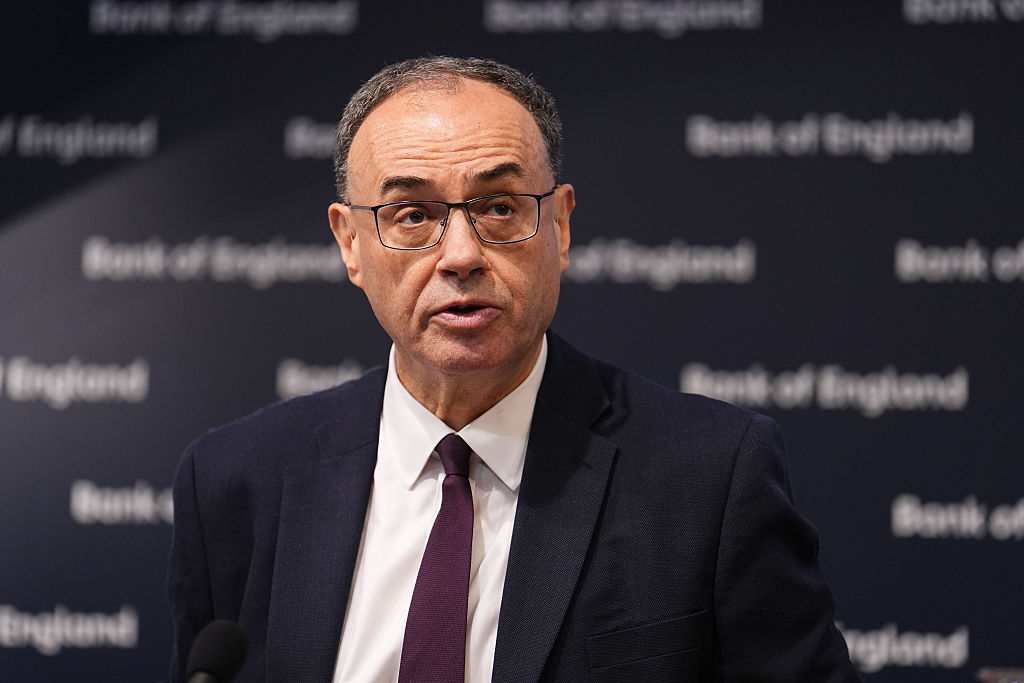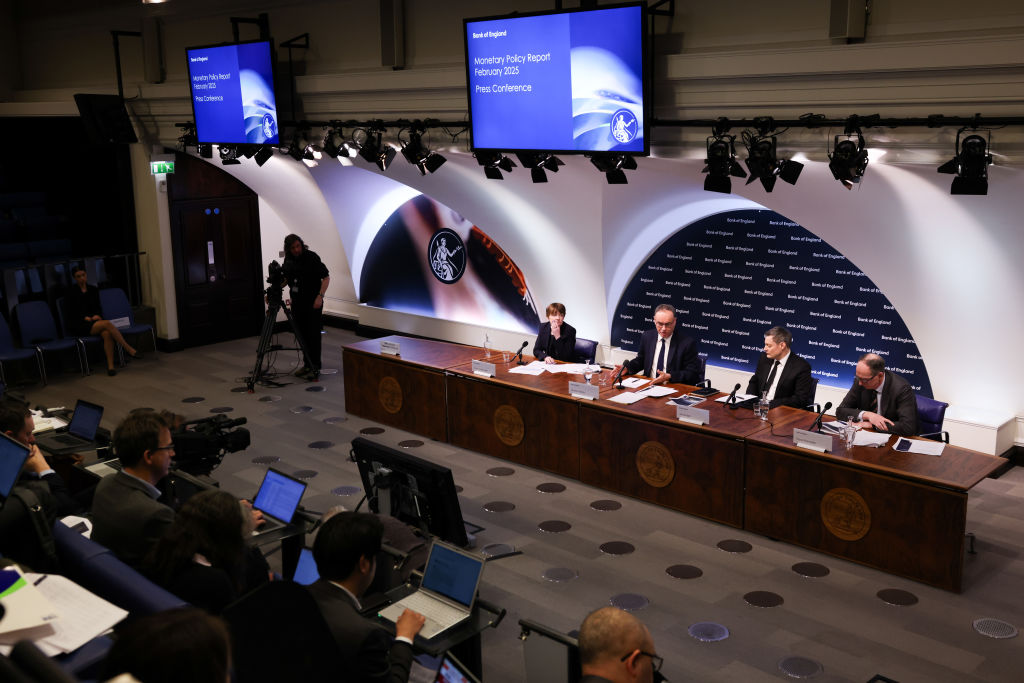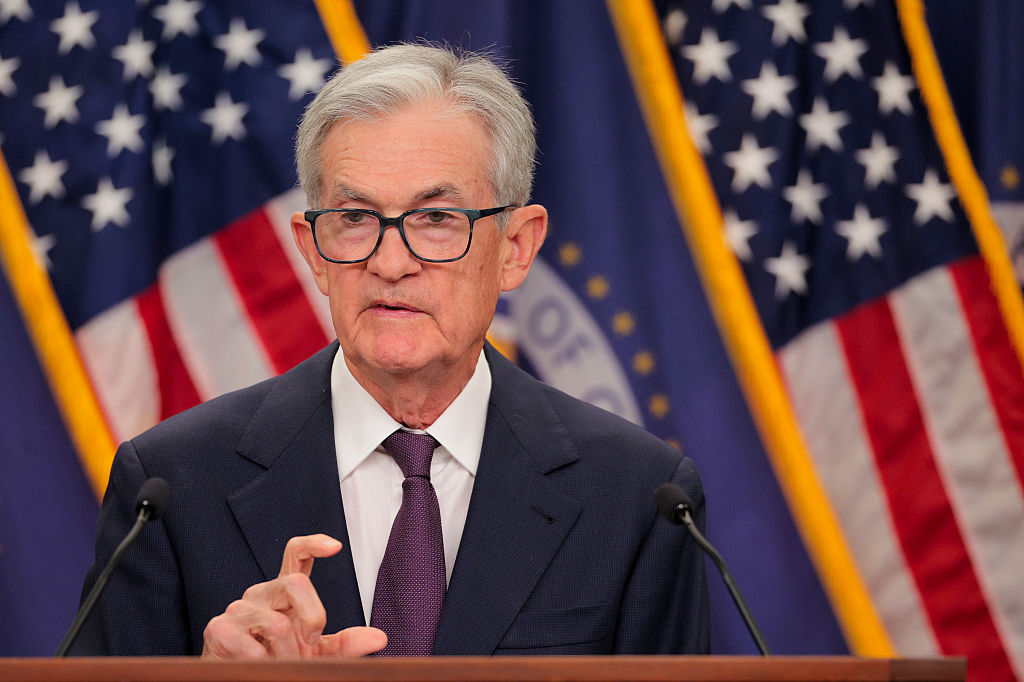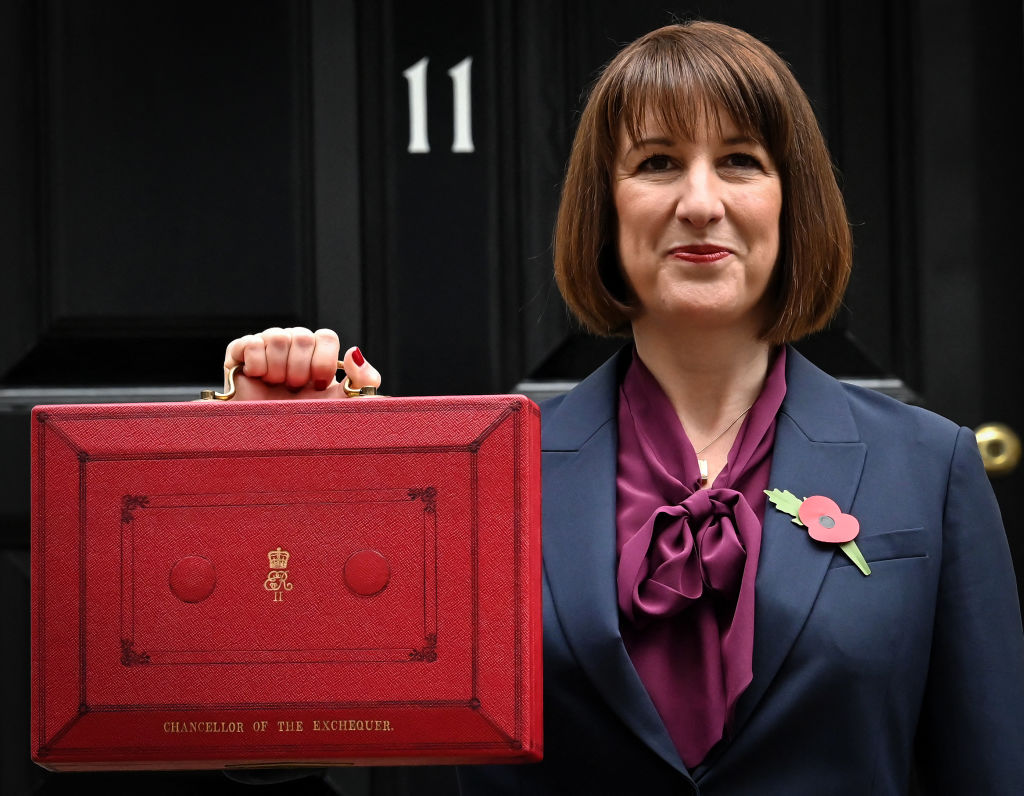Summary
- The Bank of England’s Monetary Policy Committee (MPC) voted to hold rates at 4% today (Thursday, 18 September)
- Last month the MPC lowered rates by 25 basis points in order to support the UK’s weakening economy
- Inflation, as measured by the Consumer Prices Index (CPI), hit 3.8% for the second consecutive month in August
- UK wage growth is slowing and GDP growth came in flat for July
| When will interest rates fall further? | What is inflation? | MPC meeting dates |
Experts expect UK interest rates to be unchanged following MPC’s meeting
Good afternoon, and welcome to our live coverage of tomorrow’s decision from the Bank of England’s Monetary Policy Committee (MPC) on UK interest rates.
Experts overwhelmingly expect the MPC to keep the UK base rate unchanged at 4%. The consensus is that persistent inflation will prompt the Committee to err on the side of caution, despite signs of weakness in the UK economy.

Andrew Bailey, governor of the Bank of England, following the Monetary Policy's decision last month to cut the UK base rate to 4%.
We will bring you rolling previews ahead of the decision, as well as live coverage and reaction following tomorrow’s announcement.
When does the MPC announce UK interest rates?
The MPC’s next UK interest rate decision will be announced tomorrow (18 September) at midday.
There will then be two further MPC meetings in the remainder of this year:
Date | Announced |
|---|---|
Thursday 6 November | MPC summary and minutes (including base rate decision), November Monetary Policy report |
Thursday 18 December | MPC summary and minutes (including base rate decision) |
See our calendar of MPC meeting dates for more information.
The case for a UK interest rate cut
The Bank of England has a dual mandate. On the one hand, it has to keep inflation as close as possible to its 2% target rate. On the other hand, it has to support the growth of the UK economy. Monetary policy (changing interest rates) is the key lever it can pull in order to achieve this goal.
Lower interest rates tend to support economic activity (by encouraging borrowing and investment), higher interest rates tend to curb inflation (by reducing the amount of money in circulation).
The UK economy is weakening. GDP growth came in flat for July, and the labour market is deteriorating. The number of payrolled employees fell by 8,000 in August and wage growth (of regular earnings excluding bonuses) came in at 4.8% annually between May-July, down from 5% in the previous three-month period.

The UK's labour market is weakening, but a cut to interest rates appears unlikely.
“Theoretically, softer wage data strengthens the case for another round of rate cuts,” said Kevin Brown, savings expert at Scottish Friendly.
But Brown acknowledges that sticky inflation complicates the picture, and says that “interest rates are likely to be on hold until at least spring next year”.
Inflation remains sticky, reducing chances of a UK interest rate cut
The latest inflation read, for August, was announced today (17 September). Inflation, as measured by the Consumer Prices Index (CPI), hit 3.8% for the month, unchanged from the previous reading for July.
This was in line with the Bank of England’s expectations and slightly lower than the 3.9% some analysts had forecast. But it means that inflation is still running at close to double the Bank’s 2% target.
For that reason, most experts think it is highly unlikely that the MPC will vote to cut interest rates tomorrow.
“Sticky inflation is restricting the opportunity for a fourth rate cut this year from the Bank of England,” said Scott Gardner, investment strategist at J.P. Morgan-owned digital wealth manager Nutmeg. “More progress is required on the inflation front to convince the Bank’s policymakers that a further rate cut is possible in the current economic environment.”
Gardner and others are even starting to doubt whether either of the MPC’s remaining two meetings after this week’s will result in a rate cut.
“Markets have already priced in one further cut by year-end, and whilst November may have offered opportunity for that, there’s a strong case that the MPC will exercise caution ahead of the Autumn Budget, which is shaping up to be a pivotal moment for fiscal policy,” said Steve Matthews, investment director, liquidity at Canada Life Asset Management.
How does MPC voting work?
The Monetary Policy Committee (MPC) has nine members. They are governor of the Bank of England Andrew Bailey, plus three deputy governors (for monetary policy, financial stability and markets and banking), and four external members that are appointed directly by the chancellor of the exchequer, Rachel Reeves.

Bank of England governor Andrew Bailey (centre-left) alongside fellow MPC members Clare Lombardelli (left) and Dave Ramsden (right), as well as Bank of England communications director James Bell (centre right), following February's meeting.
All nine will vote on a proposed action to take regarding interest rates. That could be to hold them steady, or to reduce the base rate by 25 basis points (the only two realistic possibilities at this meeting). It is proposed by the governor (Andrew Bailey) based on the policy they believe will be supported by the majority of the committee.
If the proposal achieves a majority, that action is passed. In the event of a tie, the governor has the deciding vote.
Most experts predict a 7-2 split in favour of keeping rates on hold at this week’s meeting.
“We are bracing for a 7-2 vote, and forward guidance that acts to dampen expectations for cuts during the remainder of the year,” said Enrique Diaz-Alvarez, chief economist at Ebury.
Could UK interest rates fall in November?
While the MPC looks nailed-on to hold rates steady at tomorrow’s meeting, there is more debate about what could happen later on.
James Smith, UK developed markets economist at ING, thinks that a rate cut at the next meeting (on 6 November) is still on the cards.
“There is still scope for services inflation to undershoot the Bank’s forecasts further in the next release for September,” says Smith. “If we’re right about that, it would tip the balance slightly more in favour of a November rate cut, which we still narrowly expect.”
Smith adds that the likelihood of tax rises in the Autumn Budget means “there’s still a decent case for UK interest rates to fall two or three more times by next summer”.
Thanks for following our coverage ahead of the MPC's UK interest rates decision tomorrow. We're finishing coverage here for today, but join us from tomorrow morning when we'll bring you more previews and analysis, ahead of the release itself at 12pm.
Good morning, and welcome back to live coverage as the Bank of England's Monetary Policy Committee (MPC) announces its latest UK interest rates decision.
The MPC will announce the results of its meeting today at 12pm.
Experts overwhelmingly expect interest rates to be held steady at 4%, but the MPC's rhetoric will be closely scrutinised for hints as to the possibility of any further rate cuts this year.
Fed cuts interest rates ahead of Bank of England’s decision
While we’ll have to wait until 12pm today for confirmation of the Bank of England’s next decision over UK interest rates, the big news overnight is that the Federal Reserve (Fed) has cut US interest rates by 25 basis points to 4.00-4.25%.
US inflation rose to 2.9% in August, up from 2.7% in July. Despite this running ahead of the Fed’s target, the central bank has opted to cut rates. Ostensibly, this is to protect the country’s weakening economy; US unemployment recently hit its highest level in the post-pandemic era.
But US president Donald Trump has also been exerting pressure on fed chair Jerome Powell and governor Lisa Cook, leading some to speculate whether the decision has been influenced by political pressure.

“Unfortunately, the timing and circumstances of today’s move make it appear more like a concession rather than a strategic policy shift, potentially fuelling concerns about the Fed’s independence,” said Isaac Stell, investment manager at Wealth Club.
Stell added that “the decision is unlikely to satisfy the president, who made it publicly known he expected a ‘big cut’, not the 0.25% the Fed has opted for”.
Will the Bank of England follow suit today and cut UK interest rates, despite sticky inflation, in order to protect the economy?
How do interest rates affect your money?
In short, higher interest rates make it more expensive to borrow, and more rewarding to save.
“Savers pay the price of cuts to the Bank of England Base Rate, and the 0.25% reduction in August has been no exception,” said Rachel Springall, finance expert at Moneyfacts. “Overall, savings rates continue on the downward trend, with the Moneyfacts Average Savings Rate now at 3.46%, down 0.34% year-on-year.
| Header Cell - Column 0 | Dec-21 | Sep-22 | Sep-23 | Sep-24 | Aug-25 | Sep-25 |
|---|---|---|---|---|---|---|
Moneyfacts Average | 0.67% | 1.82% | 4.29% | 3.80% | 3.50% | 3.46% |
Source: Moneyfacts Average Savings Rate. Calculated from the total of all on-sale, core market, variable and fixed rate savings accounts and Cash ISAs. Standard exclusions apply: Regular savings, children’s accounts, LISAs and JISAs.
As such, now is a good time to check your savings account to ensure you’re earning the best savings rate possible.
The average mortgage rate has fallen by 0.44% over the past year, according to Moneyfacts data, despite base rate having fallen 1% during that time.
| Header Cell - Column 0 | Dec-21 | Sep-22 | Sep-23 | Sep-24 | Aug-25 | Sep-25 |
|---|---|---|---|---|---|---|
Moneyfacts Average | 2.49% | 4.29% | 6.41% | 5.44% | 5.04% | 5.00% |
Source: Moneyfacts Average Mortgage Rate. Calculated from the total of all on-sale, core market, fixed and variable tracker mortgages. Standard exclusions apply: Self-build only, shared ownership only, new build only, shared equity only, standard variable rates and adverse credit.
Which MPC members are likely to vote for a cut?
Not long to go now until the MPC’s base rate decision is announced.
The general consensus seems to be that there will be a 7-2 split on the MPC today in favour of holding interest rates where they are currently. The two ‘dissenters’ will likely vote for a rate cut, given the UK’s weakening economy.
If these predictions are correct and it is indeed two members voting for a rate cut, they are likely to be Swati Dhingra, who historically has the most dovish voting record, and Alan Taylor, who surprised at the last vote by initially voting for a 50 basis point cut.
That prompted a rare re-vote, as the proposal (a 25 basis point cut) had four votes each. Taylor changed his vote to a 25 point cut, which then became policy.
It seems unlikely, though, that other MPC members will be in favour of cutting rates given the inflationary picture.
What will Bank of England base rate guidance be?
It would be a huge shock if the MPC were to vote to cut interest rates.
“If there’s any surprise in the MPC minutes, it’s likely to come from the Bank’s forward guidance,” says Sanjay Raja, chief UK economist at Deutsche Bank.
“There are three paths here the MPC can take: one, stick to its current guidance of ‘gradual and careful’ rate cuts; two, tweak its current guidance to ‘gradual and cautious’ rate cuts; or three, simply, drop the current guidance entirely.”
We’ll find out in a few minutes’ time.
BREAKING: Bank of England base rate held at 4%
As widely expected, the MPC has voted to hold UK interest rates unchanged at 4%.
Analysis and reaction to follow.
MPC votes 7-2 in favour of holding base rate unchanged
The breakdown of votes among the MPC has also followed the expected pattern.
Swati Dhingra and Alan Taylor both voted for a 25 basis point cut; the rest of the committee voted in favour of holding UK interest rates at 4%.
MPC “focused” on inflation
The MPC’s summary highlights that inflation is expected to rise slightly in September, “before falling towards the 2% target thereafter”.
“The Committee remains focused on squeezing out any existing or emerging persistent inflationary pressures, to return inflation sustainably to its 2% target in the medium term,” the minutes state.
The MPC has also reaffirmed its commitment to a “gradual and careful approach” to easing monetary policy. “The timing and pace of future reductions in the restrictiveness of policy will depend on the extent to which underlying disinflationary pressures continue to ease.”
Next UK interest rate cut could be "some months away"
It was always unlikely that the Bank of England would cut UK interest rates this month. Even without factoring in persistent inflation, over the past year the MPC has generally opted for one interest rate cut per quarter. With the last meeting resulting in a cut, today's announcement looked set to be a hold just on the basis of timing.
But next month's meeting could be more interesting. The cutting cycle cadence suggests a 25 basis point cut, but some analysts think that the MPC might play it safe given the amount of uncertainty around inflationary peaks as well as the impact of the Autumn Budget.
"Given that data for September’s CPI won’t be available until late October, it is unlikely that any softening in prices will be apparent by the time the MPC next meets on 6 November," said Jeremy Batstone-Carr, European strategist, at Raymond James Investment Services.
"With the looming potential uncertainty created by the Autumn Budget, scheduled for 26 November, the sixth rate cut in the current cycle could still be some months away," he added.
UK interest rates could depend on Autumn Budget
The timing of the Autumn Budget, about as late as it could possibly be on 26 November, looks set to tie the Bank of England’s hands at its next MPC meeting.
“The real action may lie not with the Bank, but with Westminster,” says Isaac Stell, investment manager at Wealth Club. “The Bank of England remains sat on the sidelines, waiting to see what tax and spending decisions emerge in the budget.”

“Moves prior to this could backfire," Stell continued. “The Bank likely wants to see to see whether the government manages to navigate the budgetary gauntlet before making its next play.”
Is this the end of the cutting cycle?
The focus on inflation apparent in the Bank of England’s minutes have prompted various experts to speculate about a dramatic slowdown in the pace of cuts from here.
Rob Morgan, chief investment analyst at Charles Stanley, believes that while a cut in November is unlikely, “December’s meeting could be more finely balanced”. He concludes, though, that “it’s likely the next rate cut won’t arrive until 2026”.
Others go further than this. Ed Monk, pensions and investment specialist at Fidelity International, argues that there may be no further cuts this year and just one through the whole of 2026.
“The gilt market is indicating that no further rate cuts are likely this year, with the MPC meeting in March 2026 currently looking most likely to bring the next reduction,” said Monk. “After that, it is not obvious when the next rate reduction will arrive: one more quarter-point cut from here may be as good as it gets before 2027.”
And George Brown, senior economist at Schroders, has even hinted that the MPC could look at increasing UK interest rates.
“In our view, the balance of risks is drifting towards renewed tightening given persistent domestic inflationary pressures,” said Brown. “We continue to expect rates to remain on hold this year and next, but we can’t rule out the possibility that the Bank’s next move will be up, rather than down.”
Deutsche Bank expects three more UK interest rate cuts before 2027
The uncertainty around the Bank of England’s future monetary policy is encapsulated in the range of opinions currently being expressed by different experts.
While Schroders thinks that an interest rate hike is possible before the MPC next cuts rates, Sanjay Raja, chief UK economist at Deutsche Bank, think that greater dovishness will prevail.
“Our call remains one more rate cut in Q4 2025 and two further rate cuts in 2026,” said Raja, who thinks that the Q4 cut will likely come in December.
While Raja sees UK interest rates settling at “closer to 3.25% ahead of next summer”, there is considerable uncertainty surrounding this forecast.
“Where wage settlements and underlying inflationary pressures go over the coming months will be crucial in determining the Bank’s next steps,” he said.
Former MPC rate-setter: “MPC is in no rush”
While UK interest rates are still likely trending downwards over the long term, “the MPC is in no rush,” said Michael Saunders, former MPC rate-setter and senior economic adviser at Oxford Economics.
“The MPC is clearly worried about risks of inflation persistence, especially that the current elevated level of inflation expectations will keep pay growth relatively high,” Saunders continued. “Before cutting again, the MPC will need to see stronger evidence that pay growth is slowing to a target-consistent pace and that slower pay growth will feed through to lower services inflation.”
Saunders added that, all things considered, the next rate cut would most likely come in early 2026, rather than at either of the Q4 2025 meetings.
Thank you for following our coverage of the Bank of England’s latest UK interest rate decision. That concludes live coverage for now, but join us again on 6 November for the MPC's next meeting.
